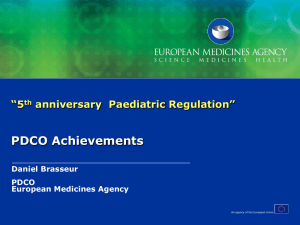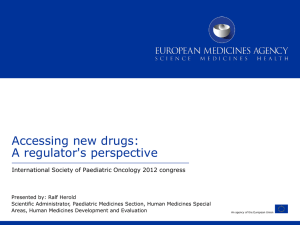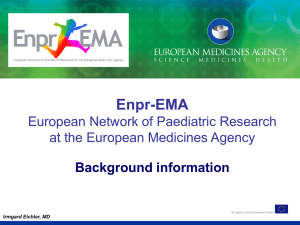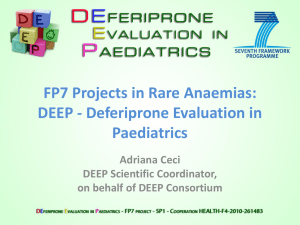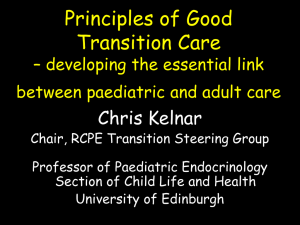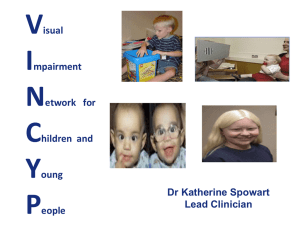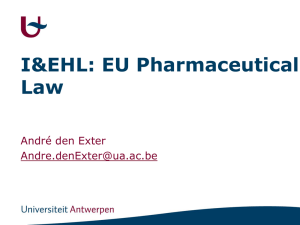PDCO Monthly report and annexes April (23-25) 2014
advertisement
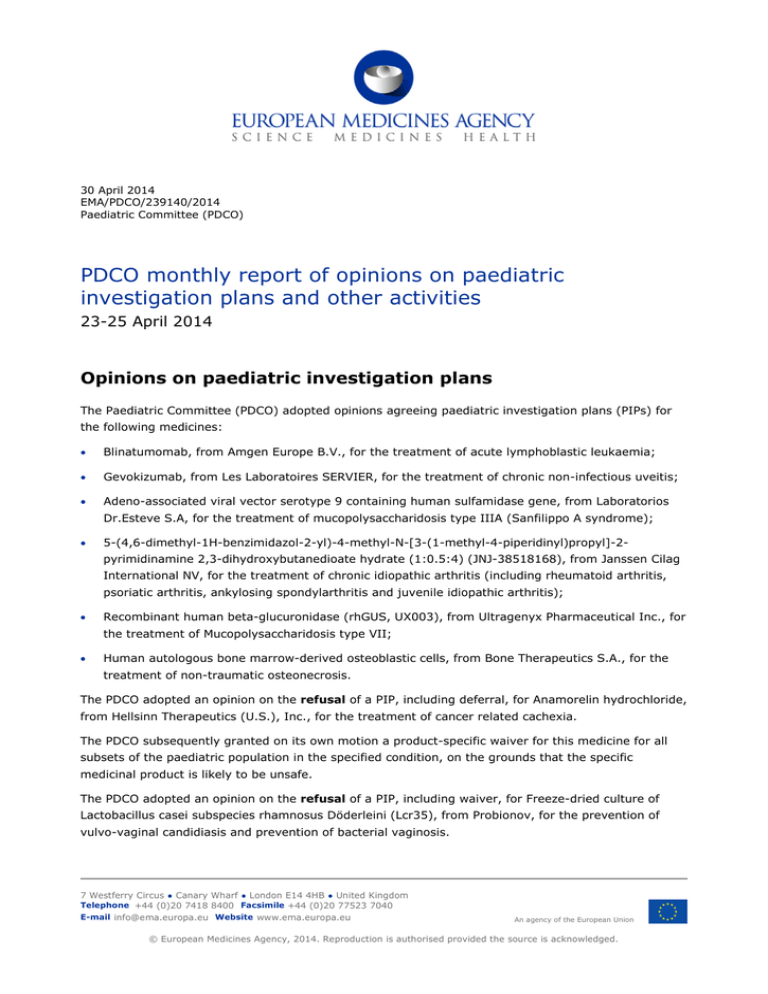
30 April 2014 EMA/PDCO/239140/2014 Paediatric Committee (PDCO) PDCO monthly report of opinions on paediatric investigation plans and other activities 23-25 April 2014 Opinions on paediatric investigation plans The Paediatric Committee (PDCO) adopted opinions agreeing paediatric investigation plans (PIPs) for the following medicines: • Blinatumomab, from Amgen Europe B.V., for the treatment of acute lymphoblastic leukaemia; • Gevokizumab, from Les Laboratoires SERVIER, for the treatment of chronic non-infectious uveitis; • Adeno-associated viral vector serotype 9 containing human sulfamidase gene, from Laboratorios Dr.Esteve S.A, for the treatment of mucopolysaccharidosis type IIIA (Sanfilippo A syndrome); • 5-(4,6-dimethyl-1H-benzimidazol-2-yl)-4-methyl-N-[3-(1-methyl-4-piperidinyl)propyl]-2pyrimidinamine 2,3-dihydroxybutanedioate hydrate (1:0.5:4) (JNJ-38518168), from Janssen Cilag International NV, for the treatment of chronic idiopathic arthritis (including rheumatoid arthritis, psoriatic arthritis, ankylosing spondylarthritis and juvenile idiopathic arthritis); • Recombinant human beta-glucuronidase (rhGUS, UX003), from Ultragenyx Pharmaceutical Inc., for the treatment of Mucopolysaccharidosis type VII; • Human autologous bone marrow-derived osteoblastic cells, from Bone Therapeutics S.A., for the treatment of non-traumatic osteonecrosis. The PDCO adopted an opinion on the refusal of a PIP, including deferral, for Anamorelin hydrochloride, from Hellsinn Therapeutics (U.S.), Inc., for the treatment of cancer related cachexia. The PDCO subsequently granted on its own motion a product-specific waiver for this medicine for all subsets of the paediatric population in the specified condition, on the grounds that the specific medicinal product is likely to be unsafe. The PDCO adopted an opinion on the refusal of a PIP, including waiver, for Freeze-dried culture of Lactobacillus casei subspecies rhamnosus Döderleini (Lcr35), from Probionov, for the prevention of vulvo-vaginal candidiasis and prevention of bacterial vaginosis. 7 Westferry Circus ● Canary Wharf ● London E14 4HB ● United Kingdom Telephone +44 (0)20 7418 8400 Facsimile +44 (0)20 77523 7040 E-mail info@ema.europa.eu Website www.ema.europa.eu An agency of the European Union © European Medicines Agency, 2014. Reproduction is authorised provided the source is acknowledged. The PDCO subsequently granted on its own motion a product-specific waiver for this medicine for all subsets of the paediatric population in the specified condition, on the grounds that the disease or condition for which the specific medicinal product is intended does not occur in the specified paediatric subsets and that clinical studies with the specific medicinal product cannot be expected to be of significant therapeutic benefit to or fulfil a therapeutic need of the specified paediatric subset(s). The PDCO adopted an opinion on the refusal of a PIP, including waiver, for Doxylamine (succinate) / pyridoxine (hydrochloride), from Duchesnay Inc., for the treatment of nausea and vomiting in pregnancy. The PDCO subsequently granted on its own motion a product-specific waiver for this medicine for all subsets of the paediatric population in the specified condition, on the grounds that clinical studies with the specific medicinal product cannot be expected to be of significant therapeutic benefit to or fulfil a therapeutic need of the specified paediatric subset(s). A PIP sets out a programme for the development of a medicine in the paediatric population. The PIP aims to generate the necessary quality, safety and efficacy data through studies to support the authorisation of the medicine for use in children of all ages. These data have to be submitted to the European Medicines Agency, or national competent authorities, as part of an application for a marketing authorisation for a new medicine, or for one covered by a patent. In some cases, a PIP may include a waiver of the studies in one or more paediatric subsets, or a deferral. Opinions on product-specific waivers The PDCO adopted positive opinions for product-specific waivers, recommending that the obligation to submit data obtained through clinical studies with children be waived in all subsets of the paediatric population, for the following medicines: • Amoxicillin, from Mayoly-Spindler, for the treatment of Helicobacter infections; • Clarithromycin, from Mayoly-Spindler, for the treatment of Helicobacter infections; • Metronidazole, from Mayoly-Spindler, for the treatment of Helicobacter infections; • Pantoprazole, from Mayoly-Spindler, for the treatment of Helicobacter infections; • (11beta,17beta)-17-hydroxy-11-[4-(methylsulfonyl)phenyl]-17-(pentafluoroethyl)estra-4,9-dien3-one, from Bayer Pharma AG, for the treatment of endometriosis and treatment of leiomyoma of uterus; • Lesinurad, from AstraZeneca AB, for the treatment of hyperuricaemia and prevention of hyperuricaemia; • Amlodipine besilate / ramipril, from Pharmaceutical Works Polpharma SA, for the treatment of hypertension. Waivers can be issued if there is evidence that the medicine concerned is likely to be ineffective or unsafe in the paediatric population, or that the disease or condition targeted occurs only in adult populations, or that the medicine, or the performance of trials, does not represent a significant therapeutic benefit over existing treatments for paediatric patients. Opinions on modifications to an agreed PIP The PDCO also adopts, every month, opinions on modifications to an agreed PIP, which can be requested by the applicant when the plan is no longer appropriate or when there are difficulties that PDCO monthly report of opinions on paediatric investigation plans and other activities EMA/PDCO/239140/2014 Page 2/7 render the plan unworkable. The PDCO adopted positive opinions, agreeing change(s), for the following products: • Abatacept, from Bristol-Myers Squibb Pharma EEIG, for the treatment of chronic idiopathic arthritis (including rheumatoid arthritis, ankylosing spondylitis, psoriatic arthritis and juvenile idiopathic arthritis); • Lubiprostone, from Sucampo Pharma Europe Ltd., for the treatment of constipation; • Raltegravir, from Merck Sharp & Dohme (Europe), Inc., for the treatment of Human Immunodeficiency Virus (HIV-1) infection; • Peginterferon alfa-2a, from Roche Registration Limited, for the treatment of chronic hepatitis C and treatment of chronic hepatitis B; • Ocrelizumab, from Roche Registration Ltd., for the treatment of multiple sclerosis; • Brivaracetam, from UCB Pharma SA, for the treatment of paediatric epilepsy syndromes, treatment of neonatal seizures and treatment of epilepsy with partial onset seizures; • Entecavir (monohydrate), from Bristol-Myers Squibb Pharma EEIG, for the treatment of chronic hepatitis B; • Conestat alfa, from Pharming Group N.V., for the treatment of hereditary angioedema; • Recombinant human monoclonal antibody to human interleukin-17A of the IgG1/kappa-class (AIN457), from Novartis Europharm Ltd, for the treatment of psoriasis vulgaris; • Fibrinogen (human plasma-derived), from LFB Biotechnologies, for the treatment of congenital fibrinogen deficiency; • Pazopanib, from Glaxo Group Limited, for the treatment of rhabdomyosarcoma, treatment of nonrhabdomyosarcoma soft tissue sarcoma and treatment of Ewing sarcoma family of tumours; • Autologous CD34+ cells transduced with lentiviral vector containing the human Wiskott Aldrich Syndrom Protein gene, from Genethon, for the treatment of Wiskott-Aldrich syndrome; • Recombinant fusion protein linking human coagulation factor IX with human albumin, from CSL Behring GmbH, for the treatment of hereditary factor IX deficiency; • Ceftolozane / tazobactam, from Cubist Pharmaceuticals (UK) Ltd, for the treatment of urinary tract infections and treatment of abdominal and gastrointestinal infections; • Agomelatine, from Les Laboratoires Servier, for the treatment of major depressive episodes and treatment of generalised anxiety disorder; • PEGylated recombinant factor VIII, from Baxter Innovations GmbH, for the treatment and prophylaxis of bleeding in patients with haemophilia A (congenital factor VIII deficiency); • Ceftazidime / avibactam, from AstraZeneca AB, for the treatment of intra-abdominal infections and treatment of urinary tract infections; • Daclizumab, from Biogen Idec Ltd, for the treatment of multiple sclerosis; • Cobimetinib, from Roche Registration Limited, for the treatment of all conditions included in the category of malignant neoplasms (except haematopoietic and lymphoid tissue) with Ras, Raf or MEK pathway activation. PDCO monthly report of opinions on paediatric investigation plans and other activities EMA/PDCO/239140/2014 Page 3/7 Withdrawals The PDCO noted that 4 applications were withdrawn during the late stages of the evaluation (30 days or less before opinion). Interaction with external experts The PDCO has regular interactions with academic experts, with a view to bringing state-of-the-art knowledge to the PDCO scientific discussions. One expert was invited to the April meeting with a clinical expertise in paediatric neurology; the PDCO discussed the challenges of conducting clinical trials in children with sleep disorders and the needs for this vulnerable population. Other matters The PDCO welcomed Dr Michaela Meciakova, in her new role as member and Prof Karol Kralinsky, in his new role as alternate, both nominated to represent Slovakia. The next meeting of the PDCO will be held on 21-23 May 2014. – END – PDCO monthly report of opinions on paediatric investigation plans and other activities EMA/PDCO/239140/2014 Page 4/7 Notes: 1. As of 26 January 2009, pharmaceutical companies that submit an application for a marketing authorisation for a medicinal product, or those that submit an application for an extension of indication, a new route of administration, or a new pharmaceutical form of a medicinal product already authorised in the European Union, have to provide either the results of studies in children conducted in accordance with an approved PIP, or an Agency’s decision on a waiver or on a deferral. 2. PDCO opinions on PIPs and waivers are transformed into Agency’s decisions within the timeframe laid down by the Paediatric Regulation (Regulation (EC) No 1901/2006, as amended). The decisions can be found on the Agency’s website at: http://www.ema.europa.eu/ema/index.jsp?curl=pages/medicines/landing/pip_search.jsp&murl=m enus/medicines/medicines.jsp&mid=WC0b01ac058001d129 3. More information about the PDCO and the Paediatric Regulation is available in the Regulatory section of the Agency’s website: http://www.ema.europa.eu/ema/index.jsp?curl=pages/regulation/general/general_content_00002 3.jsp&murl=menus/regulations/regulations.jsp&mid=WC0b01ac05800240cd 4. This meeting report, together with other information on the work of the Agency’s, can be found on the Agency’s website: http://www.ema.europa.eu Enquiries to: AskEMA (http://www.ema.europa.eu/ema/index.jsp?curl=pages/about_us/landing/ask_ema_landing_page.jsp& mid=) PDCO monthly report of opinions on paediatric investigation plans and other activities EMA/PDCO/239140/2014 Page 5/7 Annex of the April 2014 PDCO meeting report Total number of validated PIP/waiver 2012 2013 2014 Cumulative (January to (January to (January to total December) December) current (2007 to month) present) 178 198 57 1577 1 149 176 52 1227 applications Applications submitted for a product not yet authorised (Article 7 2) Applications submitted for a product (78%) 28 22 4 already authorised and still under patent, 322 (20%) in view of a submission of a variation/extension for a new indication, pharmaceutical form or route of administration (Article 82) Applications submitted for an off-patent 1 0 1 product developed specifically for children 28 (2%) with an age-appropriate formulation (Article 302) PIPs and full waiver indications covered by 218 225 62 2089 these applications Number of Paediatric Committee (PDCO) 2012 2013 2014 Cumulative total opinions (2007 to present) Positive on full waiver 47 52 22 342 Positive on PIP, including potential deferral 87 97 35 732 Negative opinions adopted 3 4 0 34 Positive opinions adopted on modification of 165 186 73 739 1 3 0 9 Positive opinions on compliance with a PIP 4 16 Negative opinions on compliance check with 0 1 0 2 0 0 0 2 a PIP Negative opinions adopted on modification of a PIP a PIP Opinions adopted under Art. 14.2 1 2 Of which 416 have been requests for a full waiver. Applications submitted in accordance with the referenced article of Regulation (EC) No 1901/2006, as amended. PDCO monthly report of opinions on paediatric investigation plans and other activities EMA/PDCO/239140/2014 Page 6/7 2012 2013 2014 (Number of (Number of (Number of areas areas areas covered)* covered)* covered)* Neurology 11 13 4 Uro-nephrology 5 9 1 Gastroenterology-hepatology 8 17 4 Pneumology-allergology 9 10 9 Infectious diseases 19 20 12 Cardiovascular diseases 34 21 6 Diagnostics 3 3 0 Endocrinology-gynaecology-fertility-metabolism 27 32 5 Neonatology-paediatric intensive care 2 3 0 Immunology-rheumatology-transplantation 15 11 3 Psychiatry 0 9 0 Pain 9 6 1 Haematology-haemostaseology 9 14 0 Otorhinolaryngology 1 3 1 Oncology 19 27 5 Dermatology 14 12 3 Vaccines 2 5 1 Ophthalmology 5 6 1 Anaesthesiology 2 0 0 Nutrition 0 0 0 Other 16 11 3 Areas covered by PIPs/waiver applications * One PIP can cover several therapeutic areas PDCO monthly report of opinions on paediatric investigation plans and other activities EMA/PDCO/239140/2014 Page 7/7
